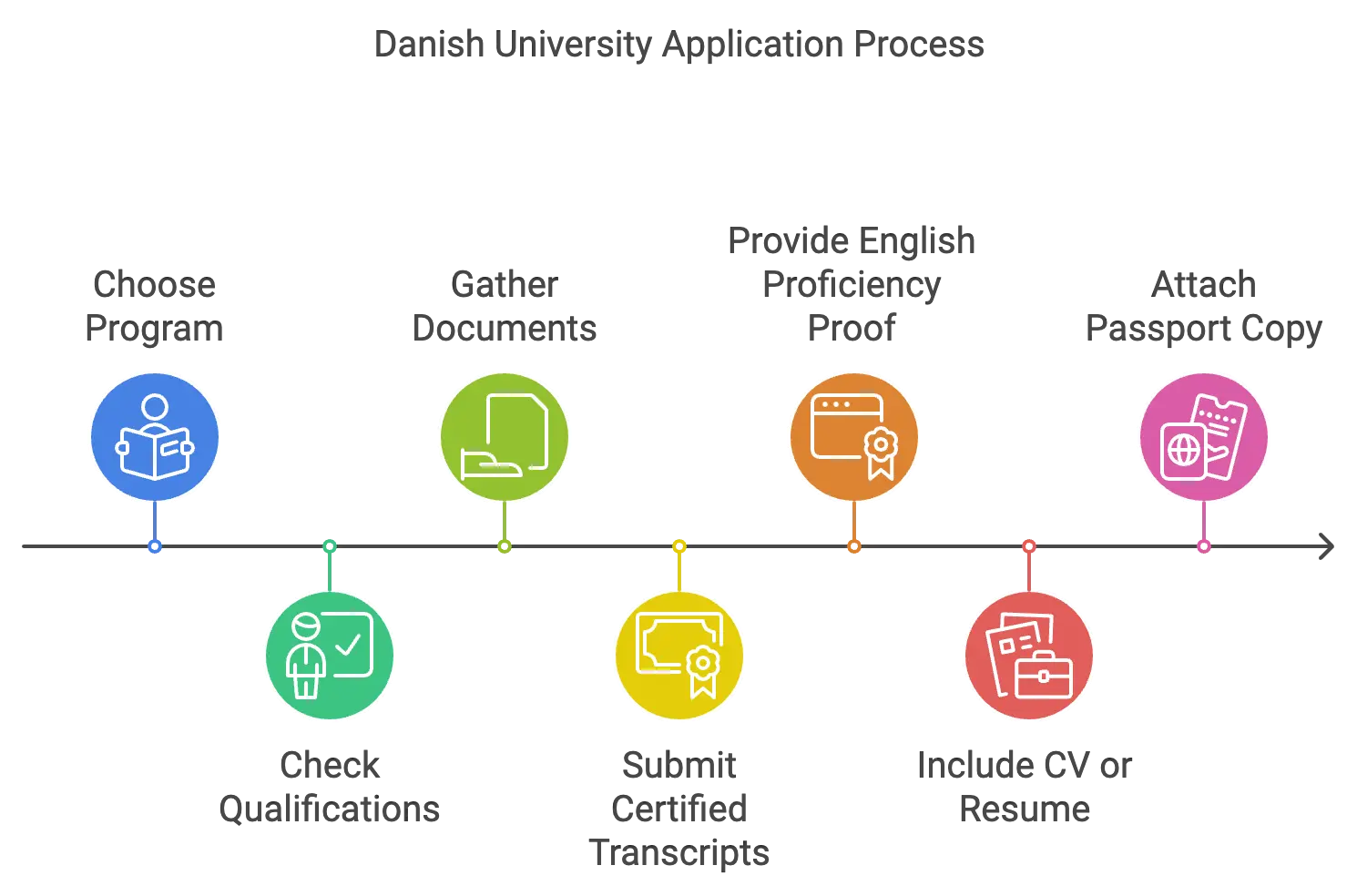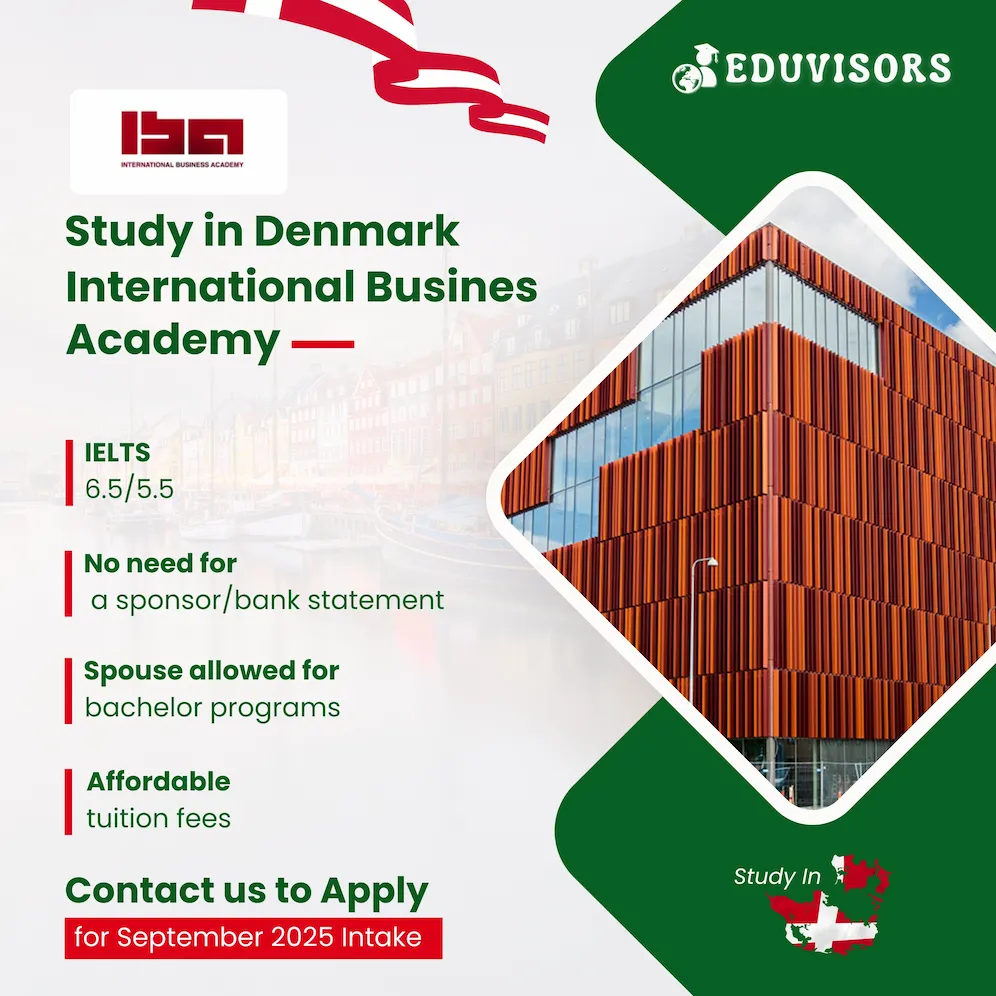Denmark offers high-quality education at affordable prices. Tuition fees for non-EU/EEA students range from DKK 22,372.56 to DKK 119,320.30 per year. This makes studying in Denmark very accessible compared to other places. Plus, about 30% of bachelor’s degrees and many master’s programs are taught in English, welcoming international students.
In this article, we’ll look at the cheapest universities in Denmark for international students. We’ll cover the country’s education system, tuition fees, living costs, and financial aid. If you’re a Bangladeshi student looking for an affordable European experience or want to get the most value from your education, Denmark’s universities are worth exploring.
Denmark’s Higher Education System
Denmark provides affordable higher education opportunities, encompassing a diverse range of institutions, including esteemed research universities and specialized colleges. These institutions prioritize delivering high-quality education and research-based teaching.
Structure of Danish University Programs
The Danish system follows the Bologna Process. It has bachelor’s degrees (3 years), master’s degrees (2 years), and doctoral degrees (3 years). These programs use the European Credit Transfer and Accumulation System (ECTS). Each year is 60 ECTS points.
Denmark also has a 7-point grading scale. This makes it easy to see how students are doing.
Academic Calendar and Admission Cycles
The academic year in Denmark starts in September, with some starting in February. The application process for international students matches this calendar. It’s important to know the deadlines and requirements for a smooth application.
Quality Standards in Danish Education
Danish universities focus on quality and innovation. They work with industries to give students real-world experiences. The Ministry of Higher Education and Science checks the quality of these institutions.
This makes Danish universities well-respected worldwide. They are known for their teaching and research excellence.
Tuition Fee Structure for International Students
Denmark’s higher education is quite affordable, especially for those from outside the EU/EEA.
EU/EEA students or permanent residents get free university education in Denmark. But, non-EU/EEA international students face tuition fees from DKK 22,372.56 to DKK 119,320.30 (about €3,000 to €16,000) per year. This depends on the university and program they pick.
The cheapest Danish universities charge between €8,000 and €10,000 yearly. Bachelor’s degrees are usually cheaper than Master’s programs. Also, international students must pay an application fee of around DKK 750 (€100) per university they apply to.
| University | Average Annual Tuition Fees (EUR) |
|---|---|
| Aarhus University | 8,000 – 15,300 |
| Technical University of Denmark | 15,000 |
| University of Copenhagen | 10,000 – 17,000 |
| University of Southern Denmark | 6,200 – 13,900 |
The cost of living in Denmark, including housing, food, and transport, is about €800 to €950 monthly. Copenhagen can be pricier, up to €1,200 monthly. But, international students can work up to 20 hours a week during term and full-time in summer. This can help cover living costs.
Cheapest Universities in Denmark
International students from Bangladesh looking for affordable education might find Denmark appealing. Eduvisors (leading educational consultants in Dhaka) can assist you in offering quality education at reasonable tuition fees.
University of Southern Denmark (SDU)
The University of Southern Denmark (SDU) is highly regarded. It offers programs from DKK 480 to DKK 2,150 per year. This makes it a top choice for international students looking for a budget-friendly, yet prestigious, education.
Aalborg University (AAU)
Aalborg University (AAU) is another great option for international students. Tuition fees range from DKK 26,700 to DKK 55,575 annually. This gives Bangladeshi students a chance to get quality education in Denmark without breaking the bank.
Roskilde University
Roskilde University is known for its unique, interdisciplinary education. Tuition fees are from DKK 66,371.92 to DKK 104,405.26 per year. It’s a more affordable option compared to many Danish universities. The university focuses on critical thinking and problem-solving, offering a unique educational experience.
Exploring these affordable Danish universities, Bangladeshi students can get quality education at a low cost. Eduvisors is here to help with the application process. They ensure a smooth transition to your desired university in Denmark.
Most Affordable Study Programs and Degrees
Cost is a significant factor for international students considering higher education in Denmark. Fortunately, Denmark offers numerous affordable study programs and low-cost Danish degree programs. These options provide high-quality education at wallet-friendly prices.
The Business Administration degree is an excellent choice, with annual tuition fees of about €10,000. Economics is another popular option, with Bachelor’s programs ranging from €6,000 to €8,500 per year. Master’s programs in Economics are slightly pricier, costing between €10,000 and €17,400 annually.
For science enthusiasts, Biotechnology offers a cost-effective path, with annual tuition fees ranging from €12,000 to €20,000. The hospitality and tourism sector provides even more affordable options, with Bachelor’s degrees starting at just €4,000 per year and Master’s programs around €7,000 annually.
These budget-friendly Danish courses and study programs deliver top-notch education without breaking the bank. By carefully considering your academic interests and financial constraints, you can find the perfect match, ensuring a fulfilling educational experience in Denmark.
| Degree | Tuition Fees (EUR) |
|---|---|
| Business Administration | 10,000 |
| Economics Bachelor | 6,000 – 8,500 |
| Economics Master | 10,000 – 17,400 |
| Biotechnology | 12,000 – 20,000 |
| Hospitality and Tourism Bachelor | 4,000 |
Cost of Living for Students in Denmark
International students need to know how much it costs to live in Denmark. Denmark is known for its high quality of life, but it can be expensive, especially in Copenhagen. Eduvisors help students plan their budgets and make smart choices about spending money.
Accommodation Expenses
Housing is the biggest expense for students in Denmark. EU students usually spend about 36% of their monthly budget on housing. Prices range from 300 to 500 EUR a month. In Copenhagen, costs can go up to 800 EUR a month.
Some universities offer student housing, which about 11% of students use.
Food and Transportation Costs
Food costs in Denmark vary, but students usually budget 200 to 270 EUR a month. Shopping at discount stores can help save money. Almost 50% of students use bicycles, and 30% use public transport.
A monthly public transport pass costs about 50 EUR. A used bicycle can cost between 30 to 135 EUR.
Healthcare and Insurance
Healthcare in Denmark is top-notch and available to all, including international students. The monthly cost for healthcare and insurance is around 200 DKK, or 27 EUR.
In summary, students in Denmark should budget 750 to 900 EUR a month for living expenses. Costs can be higher in Copenhagen. By understanding these costs and finding ways to save, international students can plan their budgets well and enjoy their time in Denmark.
| Expense Category | Estimated Cost (EUR/month) |
|---|---|
| Accommodation | 300 – 800 |
| Food | 200 – 270 |
| Transportation | 50 – 80 |
| Healthcare and Insurance | 27 |
| Total Estimated Cost | 750 – 900 |
Student Visa Requirements and Associated Costs
We know the Danish student visa process can seem tough. But with our help, you can easily start your studies in Denmark. Let’s look at what you need and the costs for a Danish student visa.
Non-EU/EEA students need a residence permit to study in Denmark. You’ll need a university offer, language skills proof, and enough money, about DKK 6,820 a month. The application fee is around EUR 333.
EU/EEA students just need a free registration certificate within three months. This makes sure they’re legally in Denmark.
- Denmark Student Visa Cost: DKK 1,900
- Denmark Student Visa Processing Time: 60 days
- English Proficiency Requirements: IELTS 6.5 – 7.0 or TOEFL 79 – 101
| Visa Type | Duration | Cost (DKK) |
|---|---|---|
| Category C Denmark Student Visa | Up to 90 days | 1,074 |
| Category D/Residence Permit Denmark Student Visa | Based on length of studies | 1,900 |
Success rates for international students applying for a Danish student visa are high, about 95%. With proper preparation, you can get your visa and begin your studies in Denmark.
Financial Aid and Scholarship Opportunities
We understand that financing your education can be challenging, particularly for international students. However, we have excellent news: Denmark offers numerous financial aid and scholarship opportunities to support your studies.
Government Scholarships
The Danish government has several scholarships for international students. You can find programs like Nordplus, Erasmus, and Erasmus Mundus/Joint Master Degree scholarships. Also, the Fulbright Denmark program and Danish government scholarships for non-EU/EEA students offer help.
University-Specific Grants
Many Danish universities give out their own scholarships and grants. For example, the University of Southern Denmark (SDU) offers scholarships for bachelor’s, master’s, and doctoral programs. These grants can really help reduce the cost for international students.
International Student Support
International students in Denmark also get support beyond scholarships. Universities have teams to help with applications, finding places to live, and more. This support makes starting your studies in Denmark easier.
We’re here to help you find all the financial aid and scholarships in Denmark. Our team can help you with the application and give you tips. Start your journey to a top education in Denmark today!
Work Opportunities During Studies
Finding work while studying in Denmark is crucial. The Danish job market offers numerous part-time and student jobs, which help cover living costs and provide valuable experience.
EU/EEA students have unrestricted work rights in Denmark. Non-EU/EEA students can work up to 20 hours per week during term time and full-time in June, July, and August. After graduation, they have a six-month window to secure employment and apply for a professional visa.
Denmark’s job market is thriving, particularly in healthcare, engineering, and IT sectors. Software developers in IT can earn between 450,000 and 700,000 DKK annually, while cleantech roles like solar panel installers command salaries ranging from 380,000 to 580,000 DKK per year.
To enhance job prospects in Denmark, students should focus on networking, learning Danish, and tailoring their résumés. University career services provide valuable assistance, helping students navigate the job market successfully.
We strongly encourage our students to explore the diverse work opportunities in Denmark. Balancing studies with work not only establishes a solid foundation for future careers but also contributes to Denmark’s economic growth.
| Student Group | Work Rights | Job Opportunities |
|---|---|---|
| EU/EEA Students | Unrestricted work rights | Various part-time and student jobs |
| Non-EU/EEA Students | Up to 20 hours per week during term time, full-time in June, July, and August | Various part-time and student jobs |
| Graduates | Six-month window to secure employment after graduation | Various professional roles |
Application Process and Deadlines
Applying to Danish universities can seem tough, but Eduvisors is here to help. First, pick the program you want and check if you qualify. Then, collect the needed documents like transcripts, test scores, and a CV.

Document Requirements
The documents needed can differ by school. But usually, you’ll need:
- Certified copies of your academic transcripts
- Proof of English proficiency (if applicable)
- A current CV or resume
- Copy of your passport
Application Fees
Applying to Danish universities is affordable for international students. EU/EEA students don’t pay fees. Non-EU/EEA students pay DKK 750 (about EUR 100) per application.
Remember, application deadlines are months before classes start. For undergraduate programs, the deadline is usually 15 March for August/September starts. Some schools also let you start in January/February, with a deadline of 1 September.
Eduvisors are here to help you through the Danish university application process. We aim for a smooth and successful application journey.
English-Taught Programs at Budget-Friendly Universities
Universities like the University of Southern Denmark (SDU), Aalborg University (AAU), and Roskilde University are known for their quality and affordability. For non-EU/EEA students, tuition fees usually fall between €6,000 and €16,000. This makes studying in Denmark more accessible to international students.
Also, Danish universities have many scholarship options for Bangladeshi students. You can find government scholarships, university grants, and support for international students. Exploring these can greatly reduce your education costs in Denmark.
If you’re thinking about an English-taught degree in Denmark, Eduvisors is here to help. We’ll guide you through the application and find the best opportunities for your future.
Student Life and Campus Facilities
We understand the importance of a vibrant student life for our international students in Denmark. Danish universities pride themselves on offering modern facilities, excellent research opportunities, and a dynamic campus atmosphere. This combination creates a unique and enriching learning experience.
Our partner universities in Denmark feature state-of-the-art libraries, advanced sports and recreational facilities, and a wide array of student organizations. These amenities foster an environment conducive to critical thinking, creativity, and collaboration skills that are fundamental to the Danish education system.
Beyond the classroom, international students at Eduvisors immerse themselves in Denmark’s rich culture, participate in social events, and explore the country’s breathtaking natural landscapes. This holistic approach to education not only enhances our students’ academic performance but also deepens their appreciation for Danish culture and traditions.

















